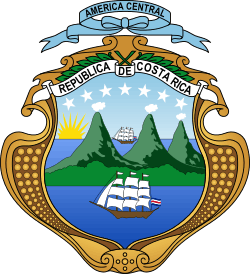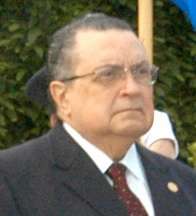Costa Rican general election, 2002
| | ||||||||||||||||||||||||||
| ||||||||||||||||||||||||||
| ||||||||||||||||||||||||||
|
| ||||||||||||||||||||||||||
| In blue cantons won by Pacheco, in green cantons won by Araya and in yellow cantons won by Solís | ||||||||||||||||||||||||||
| ||||||||||||||||||||||||||
 |
| This article is part of a series on the politics and government of Costa Rica |
|
Legislature
|
|
Judiciary |
|
General elections were held in Costa Rica on February 3, 2002.[1] For the first time in the country's history, no candidate in the presidential election passed the 40% threshold.[2] This meant a second round of voting had to be held on April 7, which saw Abel Pacheco of the Social Christian Unity Party defeat the National Liberation Party's Rolando Araya Monge.[3]
Many analysts consider this election the beginning of the end of Costa Rica’s decades-long two party system.[4][5][6] For the first time in many years alternative political forces become really relevant in the Parliament and the plenary had three large party groups; PUSC (19), PLN (17) and PAC (14).[7]
While PUSC won the presidential election and the majority in Congress, PLN became the primal opposition force in Parliament. Centre-left PAC with a progressive proposal seem to had gravely affected traditional third forces at the left of the spectrum like Democratic Force that fail to win any seat on that election even when for some years was Costa Rica’s main third party.[7] Right-wing Libertarian Movement also increases its representation from one to six deputies[7] while conservative[8] Costa Rican Renovation Party won one seat as usual.[7]
Despite the close contest, voter turnout was only 68.8% on February 3, the lowest since the 1958 elections. For the second round of the presidential elections it fell to 60.2%, the lowest since 1949.[9]
Background
Before the election, the country's Supreme Electoral Tribinal attempted to make several reforms to the electoral system. These included allowing independents to run in local elections, using electronic voting machines, allowing Costa Ricans living abroad to vote, and allowing voters to choose the top two places on parliamentary lists.[2] However, the changes were rejected by the Legislative Assembly, which noted that independent candidature was incompatible with the constitution, and that electronic voting could not be guaranteed to be secure or transparent.[2]
Results
President
| Candidate | Party | First round | Second round | ||
|---|---|---|---|---|---|
| Votes | % | Votes | % | ||
| Abel Pacheco | Social Christian Unity Party | 590,277 | 38.6 | 776,278 | 58.0 |
| Rolando Araya Monge | National Liberation Party | 475,030 | 31.1 | 563,202 | 42.0 |
| Ottón Solís | Citizens' Action Party | 400,681 | 26.2 | ||
| Otto Guevara | Movimiento Libertario | 25,815 | 1.7 | ||
| Justo Orozco Álvarez | Costa Rican Renovation Party | 16,404 | 1.1 | ||
| Walter Muñoz Céspedes | National Integration Party | 6,235 | 0.4 | ||
| Vladimir De la Cruz De Lemos | Democratic Force | 4,121 | 0.3 | ||
| Walter Coto Molina | Coalition Change 2000 | 3,970 | 0.2 | ||
| Rolando Angulo Zeledón | General Union | 2,655 | 0.2 | ||
| Daniel Reynolds Vargas | Patriótico Nacional | 1,680 | 0.1 | ||
| Marvin Calvo Montoya | Christian National Alliance | 1,271 | 0.1 | ||
| Pablo Angulo Casasola | National Rescue Party | 905 | 0.0 | ||
| Invalid/blank votes | 39,573 | - | 33,463 | - | |
| Total | 1,569,418 | 100 | 1,372,943 | 100 | |
| Source: Nohlen | |||||
Parliament
| Party | Votes | % | Seats | +/- |
|---|---|---|---|---|
| Social Christian Unity Party | 453,201 | 29.8 | 19 | -8 |
| National Liberation Party | 412,383 | 27.1 | 17 | -6 |
| Citizens' Action Party | 334,162 | 22.0 | 14 | New |
| Movimiento Libertario | 142,152 | 9.3 | 6 | +5 |
| Costa Rican Renovation Party | 54,699 | 3.6 | 1 | 0 |
| Democratic Force | 30,172 | 2.0 | 0 | -3 |
| National Integration Party | 26,084 | 1.7 | 0 | -1 |
| Coalition Change 2000 | 12,992 | 0.8 | 0 | New |
| Agrarian Labour Action Party | 10,890 | 0.7 | 0 | -1 |
| Independiente Obrero | 8,044 | 0.5 | 0 | New |
| Patriótico Nacional | 7,123 | 0.5 | 0 | New |
| Cartago Agrarian Union Party | 6,974 | 0.5 | 0 | 0 |
| Christian National Alliance | 6,825 | 0.4 | 0 | 0 |
| General Union | 5,883 | 0.4 | 0 | 0 |
| National Rescue Party | 4,937 | 0.3 | 0 | 0 |
| Partido Agrario Nacional | 2,595 | 0.2 | 0 | New |
| Cartago Agrarian Force | 1,390 | 0.1 | 0 | 0 |
| Convergencia Nacional | 1,348 | 0.1 | 0 | 0 |
| Invalid/blank votes | 47,484 | - | - | - |
| Total | 1,569,338 | 100 | 57 | 0 |
| Source: Nohlen | ||||
References
- ↑ Nohlen, D (2005) Elections in the Americas: A data handbook, Volume I, p155 ISBN 978-0-19-928357-6
- 1 2 3 Nohlen, p. 150.
- ↑ "Election profile: Costa Rica". International Foundation for Electoral Systems. 1 September 2006. Retrieved 26 June 2011. Check date values in:
|year= / |date= mismatch(help) - ↑ Landsford, Tom. Political Handbook of the World 2014. Retrieved 13 March 2016.
- ↑ Landsford, Tom. Political Handbook of the World 2012. Retrieved 13 March 2016.
- ↑ Greenspana, Eliot; Gill, Nicholas; O'Malley, Charlie; Gilsenan, Patrick; Perill, Jisel. [Elecciones legislativas de Costa Rica de 2002 Frommer's Central America] Check
|url=value (help). Retrieved 13 March 2016. - 1 2 3 4 "February 5, 2002 Legislative Assembly Election Results - Costa Rica Totals". Election Resources. Retrieved 13 March 2016.
- ↑ Lopez, Jaime (July 18, 2013). "Civic Groups Move Against Gay Marriage in Costa Rica". Costa Rica Star. Retrieved 13 March 2016.
- ↑ Nohlen, pp. 156–157.


